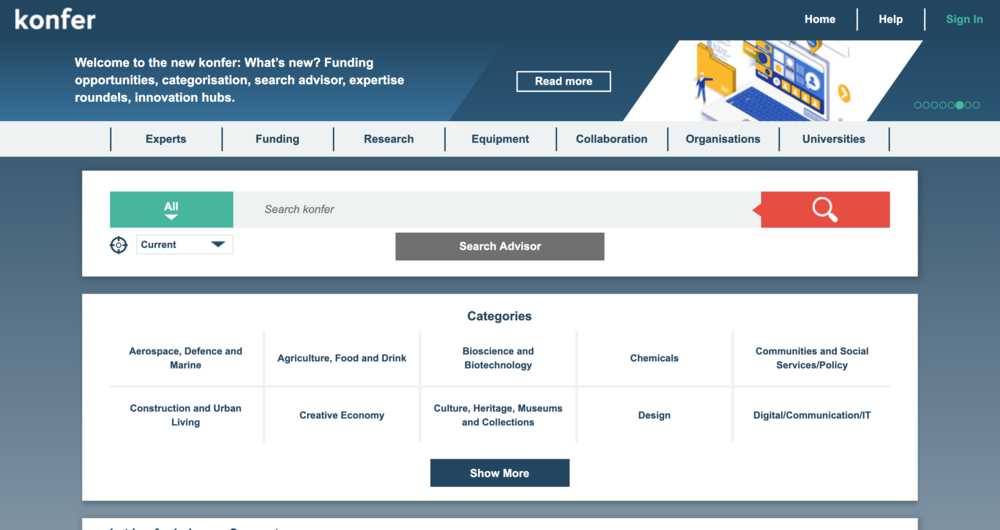konfer
Specialised search that helps businesses find relevant research expertise and equipment in UK research institutions.

Case study
Purpose
konfer is an online platform that helps businesses to connect with universities so they can collaborate. Primarily, it aims to help SMEs connect with relevant researchers at universities.
For SMEs who are not involved in existing collaborations with universities and who lack dedicated teams for scouting university IP, it can be challenging to find universities that are doing work relevant to their business, and to also connect with the right person within those institutions.
More generally, konfer aims to uncover research, expertise, funding sources and other under-utilised resources within universities and make this information available to businesses, governments and the charitable sector to enable sharing, cooperation, collaboration and innovation.
Design of the tool
konfer was created by the National Centre for Universities and Businesses (NCUB), the Higher Education Funding Council for England (HEFCE), Research Councils UK (RCUK) and Innovate UK in 2015.
The platform was intended to fill a gap in the innovation brokerage space by encouraging business-university interactions through a digital tool. Recognising that data on what universities were working on was already widely available, the partners decided against creating another database that universities would have to constantly update. Instead, they designed konfer to make use of these existing, publically available data sources. These include ORCID, the REF Impact Case Studies database, UKRI’s Gateway to Research Portal, Jisc’s equipment.data, Youtube, university websites and funding opportunities from the UK’s KTN.
The platform is primarily oriented around the needs of businesses and has two main use cases. The first is where a user can search for a type of expertise they are looking for, such as ‘engineering production processes’. This search returns geographically mapped search results in the form of profiles and articles in categories including experts, collaborations, funding calls, facilities (equipment), research, web and social, universities, and businesses.
konfer then provides a way to connect directly to researchers or to each university’s business engagement team via an in-platform messaging service. Following a second use case, a business may instead choose to attract interest from universities by posting a collaboration request or open innovation challenge outlining a problem. konfer pushes these opportunities to universities that may be interested in helping to solve these problems.
konfer’s search functionality uses Elasticsearch search engine technology. This allows it to search, sort and return results based on whether a document contains the search terms. When prioritising search results to display, konfer also considers how many times these terms appear in the document compared to how many times they appear in all documents konfer can access through a search, and where these terms appear within a document (e.g. an appearance in a title and again in the body text of a document may indicate higher relevance than an appearance in body text only). Using this technology, konfer is able to add additional data sources if relevant, and to tweak and improve search and ranking functionalities as needed.
Implementation
Discussions between NCUB and the research councils started in 2012 to explore the possibility of using digital tools for innovation brokerage. A business plan was developed in 2013 and a prototype was developed in 2015. The first public beta release of konfer was in 2016.
Impact
The NCUB continues to update and develop konfer, including assessing usability and the extent to which the platform is able to broker university–business relationships and innovations. By tracking interactions through the contact tool, konfer can track whether businesses are successful in finding the right university fit, and help businesses who have been unsuccessful find another, more suitable institution. The tool helps to compare expertise and facility offerings between universities, which konfer’s creators hope will result in better-matched research services for businesses, and also more successful industry relationships for universities. In the longer run, it could help enable more firms to be able to do R&D. According to Innovate UK, 75 per cent of R&D in the UK is carried out by 400 businesses. konfer hope that brokerage will help inspire other businesses to do R&D.^[^1]^ At the time of writing, konfer is backed by 132 UK universities and includes profiles of 130,000 academics who can collaborate on research projects. However, the success of the platform and its impact will need to be assessed over time.
Comparison with other sectors and tools
Strengths: Unlike many innovation brokerage tools, konfer does not generate its own data. Instead it relies on data that is already in the public domain. This means that universities and researchers listed on the platform do not have yet another online presence to keep updated.
Weaknesses: konfer’s use of external data also means that they are dependent on the characteristics and quality of existing data sets. Also, like most other digital innovation brokerage tools, konfer does little to handle the relationship-building side of innovation brokerage. konfer is intended to play a role in opening up more opportunities than any single knowledge exchange team would be able to have. However, for konfer-brokered relationships to realise innovation, human facilitation is still needed to select and build good collaborations.
Key takeaways
konfer takes a government-led approach to university–industry collaboration, and will have to attract both university and industry users to be successful. One challenge konfer have encountered is resistance from existing actors. For example, universities sometimes want to avoid it being possible to search for and compare across multiple universities. Instead, they might want to maintain relationships with the businesses in their area without competition from other universities. However, if konfer is able to overall increase the pool of businesses looking for collaboration, it should make universities less concerned about this issue.
References
https://konfer.online/howitworks
https://www.ukri.org/innovation/working-with-business/konfer/
http://www.ncub.co.uk/blog/konfer-collaboration-platform-alpha-phase.html